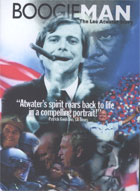
Boogie Man: The Lee Atwater Story 2008
Distributed by Interpositive Media, 249 West 29th Street,16th Floor, New York, NY 10001
Produced by Noland Walker and Stefan Forbes
Directed by Stefan Forbes
DVD, color, 86 min.
College - Adult
American Studies, Media Studies, Political Science
Date Entered: 11/05/2008
Reviewed by Michael J. Coffta, Business Librarian, Bloomsburg University of PennsylvaniaBoogie Man chronicles and studies the political strategies and tactics of Lee Atwater, the campaign specialist for the Republican Party for the Ronald Reagan and George. H. W. Bush campaigns. This is a truly probing piece of work that critically examines without demonizing him, or making him appear to be the “Boogie Man” who masterminded an onslaught of negative campaigns. Analysts were quick to say that Atwater “did not leave his fingerprints on his dirty tricks,” yet he became a national celebrity. He took an issue and used it as a wedge. He was also skilled in creating subtexts and using voters’ fears to his advantage.
It should be known that the filmmakers do not merely portray Atwater as a scheming, devious mind, but provide ample treatment of his articulacy and flamboyance. As a musician and one with great Southern charm, he was able to assume the role of the anti-establishment promoter of the establishment (i.e. the Republican Party). He demonstrated a great deal of political savvy, and even perceived Bill Clinton to be a threat to George H. W. Bush long before the 1992 election.
On an historical front, this comprehensive film dissects the campaigns in which Atwater was deeply involved: chiefly, the Reagan primary campaign, the Reagan Presidential campaigns of 1980 and 1984, and the George H. W. Bush Presidential campaign of 1988. The audience witnesses the personal intrigues and relationships among politicians, reporters, and aides. The pinnacle of his craftiness is witnessed in the 1988 Presidential campaign when he orchestrated the deflection of serious allegations against Bush for his involvement in the Iran-Contra scandal to smear tactics against Dukakis, including the ads probing weekend furloughs, Kitty Dukakis’s alleged anti-patriotism, and Michael Dukakis’s mental health. The film concludes with an account of Atwater’s losing battle with cancer and conflicting reports of his deathbed confessions in 1991.
This work is wildly compelling and informative. It remarkably manages to preserve impartiality throughout its examination of this volatile figure. Strangely, Atwater seemingly continues to cast his spell on the viewers of this film. Through this documentary, audiences will gain an intense understanding of the personality, heights, depths, and legacy of this immeasurably shrewd Republican campaign manager.
It should be noted that with honest depictions of conversations among the principals of this documentary, there is a fair amount of rough language.